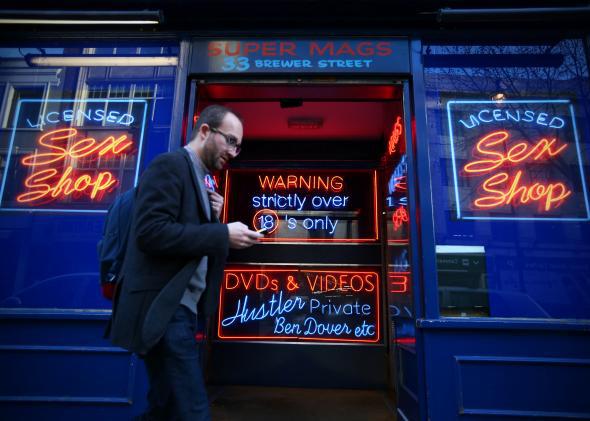Over the weekend, the New York Times published one of the most frustrating, yell-at-the-screen articles I’ve read in a long time. The piece, cheekily headlined “Chelsea’s Risqué Businesses,” explored an ongoing skirmish in Chelsea, a Manhattan neighborhood that used to be edgy and largely gay but that’s now mainly blanketed in the boringness of gentrification. The fact that no one actually thinks of 2015 Chelsea as particularly seedy, in a gay sense or otherwise, makes the battle—which apparently has sanctimonious gay parents trying to drive out gay porn/novelty shop owners in the name of the CHILDREN—all the more exasperating. But, as I explored in my recent long-form piece on the history and future of gay culture, the phenomenon of gay people attacking traditionally gay spaces and practices in the name of respectability is, sadly, nothing new. Indeed, it’s been the main mechanism by which much of the mainstream advocate class has tried to cajole “equality” from straight people in the wake of the first AIDS crisis.
But back to Chelsea. Michael Winerip, the reporter on the piece, talked to a number of parents in the area who view the shops—which purvey clothing and accessories designed primarily for gay men, as well as personal lubricant, condoms, and sex aids alongside quaint porn DVDs and viewing booths—as existential threats to their precious angels, even though their incorrigible presence in the neighborhood hardly reaches red light district levels of sidewalk intrusion.
Scott McCormick, who is gay and the father of two young children, said the neighborhood opposition is not about homophobia. “I’m pretty liberal, but I’m conservative when it comes to raising children,” he said. “There are several schools in the neighborhood—every day we’re walking past these stores 10 times.”
One might imagine that, when the children are old enough, McCormick could use one of these many opportunities to fill the kids in on how gays played a pivotal role in this country’s history of sexual liberation and how openness about sex and sexuality is a value to be proud of. But instead, he and his fellow morality police want the stores shuttered—precisely because they are phobic of homos who haven’t chosen to live in the ways they deem appropriate.
To be clear, if these establishments were really causing disruptions in the neighborhood, I might be willing to hear this complaint. But the “evidence” is silly:
Neighbors complain that they find used condoms and latex gloves in front of their homes, have light bulbs removed to darken their vestibules, and see men having sex in the hours before dawn on playground benches.
I find condoms on the New York sidewalk a few times a week, and you know what I think, every single time? I’m glad someone decided to use this when they got laid. I have no idea what a latex glove portends, and if lightbulbs are being stolen out of your building, I’m not sure how that’s the porn store owner’s problem. Late-night sex on benches is arguably a public nuisance, but as the article points out, the local police have not found such activities to be a major problem in the area. If it’s really going on constantly, the thing to do might be to stop watching the scene, pearls undoubtedly clutched, and call the cops.
I realize I’m being hard on these people, parents who I’m sure just want what’s best for their children. But they’ve got to realize that this campaign is a total betrayal of a history of sexually inclusive activism that has made it possible for them to even raise kids and build lives together in this now-fancy neighborhood in the first place. The desire on the part of many gays to assimilate into traditionally straight ways of living is not in itself a bad thing; the problem comes when that move is made as some kind of repudiation of other, gayer ways of living, particularly as manifested with regard to important gay spaces like bars and shops. Throughout the article, the parents express disdain for the idea that gay men are meeting at these stores and then later engaging in sex (perhaps paid sex in some cases), revealing a hostility toward lifestyles and models of socializing that are different from their own. This campaign isn’t really (or only) about protecting childhood innocence; it’s about loudly proclaiming in the community board meeting or the pages of the New York Times that you are not that kind of gay—and it’s not a cute look.
To the reporter’s credit, he seems to recognize that at least some of this purge is based in respectability posturing: “Stores that their young, wilder selves might have found amusing and perhaps frequented are now seen as a bad influence on the children.” Such changes of heart are of great import, I’m sure, to the gays who’ve selected other life paths. Luckily, not all of Winerip’s sources lack the self-awareness to see how frustrating this imposing of personal choices might be:
A father of a young child said that he would like to see the shops shuttered. But he also said he didn’t feel he could speak publicly because as a younger man, he would visit sex shops. ‘It would be hypocritical,’ he said.
Yes, yes it would.
